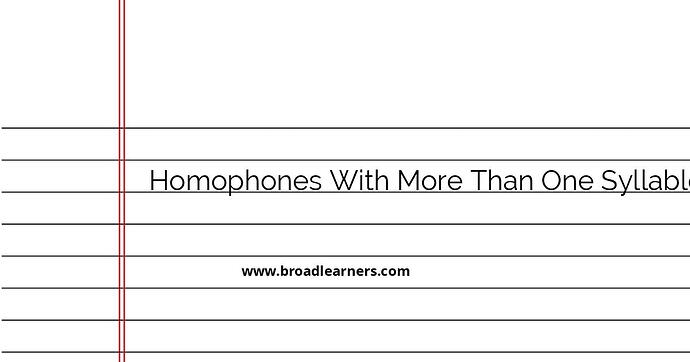Homophones are words that sound alike but have different meanings, origins, or spellings. They play a significant role in the intricacies of the English language. Understanding homophones with more than one syllable can help improve your language skills and prevent misunderstandings in communication. In this article, we will explore some common homophones with more than one syllable, their meanings, and examples illustrating their use:
- 1.
- Stationary vs. Stationery
- The car remained stationary during the entire red light.
- She loves collecting different types of stationery for her bullet journaling.
- 2.
- Role vs. Roll
- She was delighted to be cast in the role of Juliet in the play.
- He watched the marble roll down the ramp.
- The bakery sold ten different varieties of dinner rolls.
- 3.
- Moral vs. Morale
- The moral of the story was to always be honest.
- The teacher focused on teaching moral values to her students.
- After the team's victory, their morale was at an all-time high.
- 4.
- Complement vs. Compliment
- The wine perfectly complemented the flavors of the dish.
- He gave her a genuine compliment on her beautiful singing voice.
- 5.
- Parade vs. Parried
- The annual holiday parade attracted thousands of people to the city center.
- The experienced fencer parried his opponent's thrust skillfully.
Stationary (adjective): Not moving or not intended to be moved.
Stationery (noun): Writing materials such as paper, envelopes, and pens.
Examples:
Role (noun): A character or part played by someone; function or position.
Roll (verb/noun): To move in a circular motion; a cylindrical object or a small loaf of bread.
Examples:
Moral (adjective/noun): Pertaining to principles of right and wrong; the lesson of a story.
Morale (noun): The confidence, enthusiasm, and discipline of a person or group at a particular time.
Examples:
Complement (verb/noun): Something that completes or enhances something else.
Compliment (noun/verb): An expression of praise or admiration.
Examples:
Parade (noun): A public procession, especially one celebrating a special day or event.
Parried (verb): Deflected or warded off (an attack or weapon).
Examples:
By familiarizing yourself with these homophones, you can enhance your understanding of the English language and communicate more effectively. Such knowledge assists in distinguishing between words that might otherwise be confusing, strengthening both written and spoken proficiency.
Did I miss anything? Respond below
